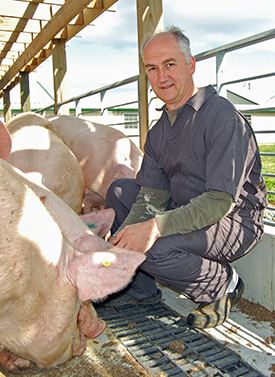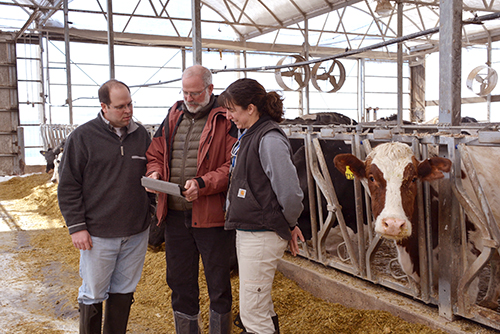When Bob Ruth of Clemens Food Group set up two swine farms in Pennsylvania in the mid-1990s, one of the first things he did was call Penn’s School of Veterinary Medicine.
“To begin with, it was around executing health programs, starting up my studs using artificial insemination,” Ruth says. “Later, when I sold my farms and began working with Clemens Food Group, we got very interested in animal welfare issues.”
 Working with Penn Vet’s Tom Parsons, an associate professor of swine production medicine and director of the Swine Teaching and Research Center, and Gary Althouse, professor and chair of the Department of Clinical Studies at New Bolton Center, Ruth has embraced new models of modern agriculture and, as a result, has found himself and his operations at the leading edge of the industry.
Working with Penn Vet’s Tom Parsons, an associate professor of swine production medicine and director of the Swine Teaching and Research Center, and Gary Althouse, professor and chair of the Department of Clinical Studies at New Bolton Center, Ruth has embraced new models of modern agriculture and, as a result, has found himself and his operations at the leading edge of the industry.
“I have to pinch myself sometimes,” Ruth says. “We’re a relatively small company and yet we find ourselves constantly being asked by larger companies to tour our facilities, to learn from us. And we always bring them to Penn.”
As Pennsylvania’s only veterinary school, Penn Vet plays an outsize role in supporting the state’s agricultural producers. Nearly three-quarters of the school’s graduates remain in the state to practice, operating in 65 of Pennsylvania’s 67 counties. Meanwhile, Penn Vet clinicians and researchers devote themselves to developing new tools and techniques that advance the agricultural industry—not only in terms of economic performance, but also from the standpoint of protecting the health of animals, the environment, and the people who work in and around farms.
“We have some very good front-line practitioners in the state,” says Parsons, “and that is a luxury. What that allows us to do at the University is to focus on specialties, on programs that can supplement and extend what the front-line practitioners are doing.
“To me what’s exciting about that is the competitive advantage that we bring to Pennsylvania producers, giving them access to expertise that is national and international in quality,” he adds.
For pork producers, Penn Vet’s innovations include alternatives to gestation crates that allow for loose housing for sows and improvements in artificial insemination. The school is also home to a disease surveillance program, run by Meghann Pierdon, assistant director of the Swine Center, that tracks 90 percent of the pigs in Pennsylvania and is credited with reducing outbreaks of common infections.
On the dairy producer side, Penn staff veterinarians Linda Baker and Joe Bender work directly with 28 herds, totaling 12,000 animals, conducting field investigations and offering nutritional consultations.
“The herds that we work with have higher milk yields and lower feed costs,” says David Galligan, a professor of animal health economics. “Our herds will tend to produce 3,300 pounds of milk per year more than the state average, which works out to an additional $600 per cow per year in value.”

An additional 300 herds use software developed through the Center for Animal Health and Productivity, which Galligan directs, to optimize herd nutrition.
Galligan says good nutrition not only keeps farms profitable, it also has ripple effects in keeping animals healthy and reducing the impact on the surrounding environment, as more efficient use of crops means less waste.
Fourth-generation farmer Walt Moore of Chester County’s Walmoore Holsteins has witnessed the benefits of working with Galligan and others at Penn Vet. His connection to Penn Vet began with his father, who worked with New Bolton Center Hospital’s Field Service from its beginning in the 1950s. The Field Service provides routine and emergency care to equine and food animal clients within 30 miles of New Bolton Center.
Now, Moore not only relies on the Field Service, led by Michaela Kristula, to keep his animals healthy, but also maintains open lines of communication with Galligan and nutrition professor James Ferguson to push forward the economic side of his business.
“Their expertise has been invaluable,” Moore says. “As the industry has evolved, they’ve always been there helping us stay on the front edge. I’m thankful for that every day.”